Remember when you order to please tell us your preference about shipping. As we’ve noted often, USPS is slower than usual these days and while “Media Mail” is the cheapest ($3.25 for one or two books) it may take longer than usual. UPS cost about $7.00 or $8.00 for one or two books but is more reliable. Please tell us any needs you have in the secure order form page when you enter your information so we can serve you well.
The link to the Hearts & Minds Bookstore order form page is at the end of this BookNotes newsletter.
ALL BOOKS MENTIONED ARE 20% OFF.
I hope you saw the last BookNotes newsletter which announced a few new Lenten devotionals and other suggested titles for this liturgical season. We also offered some links to older BookNotes that offered Lenten resources. A number of folks said they found it helpful and we thank those who send us orders or came by our back year for curbside pickup.
In between our pandemic-inspired backyard customer service [we are still closed for in-store shopping] and creating lists for folks who have made online inquiries, I wandered around the store and wondered: what else would fit the mood of this cultural moment and the upcoming liturgical season? What books might we tell you about for this Lenten time, even if they aren’t about Lent as such. We named a good handful last time and that inspired me to share more – here are some that might work for you and your needs right now. A few are brand new and others are ones I’ve told you about before.
Here then, another list of good books for complicated times in the very hard Year of Our Lord, Lent 2021.
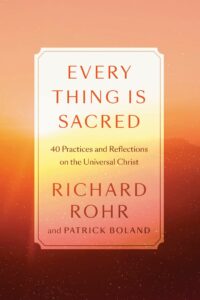 Every Thing is Sacred: 40 Practices and Reflection on the Universal Christ Richard Rohr (Convergent) $22.00 OUR SALE PRICE = $17.60
Every Thing is Sacred: 40 Practices and Reflection on the Universal Christ Richard Rohr (Convergent) $22.00 OUR SALE PRICE = $17.60
Many found the 2019 book by Father Rohr, the famous Franciscan (known for a good intertwining of mystical spirituality and social justice, peace, and ecological activism) called The Universal Christ: How a Forgotten Reality Can Change Everything We See, Hope For, and Believe, to be mostly wise and quite stimulating, if at times a bit theologically off-center. Anyone who has read Colossians 1 knows that Christ makes universal claims about the creation-wide scope of His Lordship over all things. As a gentle and servant King, he is utterly loving but his divine nature makes him supreme over all things, universally so. That Rohr book, The Universal Christ, is an important, poetic, rumination about Christ and his unfathomably gracious work in and through “all things” and it just came out in paperback (selling for $17.00 – but at our 20% off, $13.60.) And a brand new companion volume was just released.
This new hardback, Every Thing Is Sacred: 40 Practices… just came a day or so ago and it is a spiritual handbook to help you apply some of the insights explored in The Universal Christ. As Rohr says in the introduction, “This is incarnational Christianity!” And he means that – we don’t know Jesus only in our heads but in our bodies. As he writes about this book of practices, “our hope is that this knowledge will not be stored away in disconnected theory but be connected to the here and now, and thus everywhere.” As I’ve glanced through it quickly, I’d say this, too: I think Every Thing is Sacred: 40 Practices and Reflection on the Universal Christ could easily be used even if you haven’t read Rohr’s companion book.
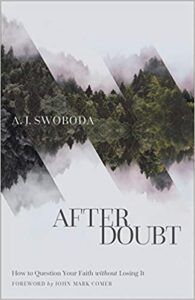 After Doubt: How to Question Your Faith Without Losing It A.J. Swoboda (Brazos) $18.99 OUR SALE PRICE = $15.19
After Doubt: How to Question Your Faith Without Losing It A.J. Swoboda (Brazos) $18.99 OUR SALE PRICE = $15.19
Brazos Press keeps releasing amazing books that are vital contributions to the broader world of religious publishing. A year or two ago A. J. was on our “best of” list (and, admittedly, on other Best of lists as well) for his extraordinary, thorough, beautiful, challenging, Subversive Sabbath. Here, in this brand new one, he offers his honest appraisal of doubt and deconstruction. This is no simplistic rebuttal, not a cheery reminder of the truth of all things Christian. It takes the concerns of those with doubts seriously; it takes the doubts seriously. It is, perhaps, the best thing we’ve seen on the topic, although I admit to only spending a bit of time skimming it. It is brand new – technically releasing in March. We are happy to tell you about it a bit early and suggest it as a very appropriate Lenten study.
By the way, this isn’t utterly new ground for Swoboda. We really liked his 2016 book The Dusty Ones: Why Wandering Deepens Your Faith which hints at this conversation, using the biblical narrative of wandering to show readers that being a bit lost is not only an essential aspect of Christian spirituality, it is a discipline to be practiced.
You may recall that we recently announced that we were glad to be a sure source for Brian McLaren’s new Faith Beyond Doubt: Why Your Beliefs Stopped Working and What to Do About It (St. Martin’s Press; $26.99, with our 20% off sale price = $21.59.) It is a very important book, a bit different then my other favorites on the topic (for instance, Os Guinness’s God in the Dark or Beyond Doubt by Cornelius Plantinga, both writers I greatly admire.) It is the only McLaren book I’ve not finished – this Covid stuff has made keeping up with reading a real struggle for me. But I am liking it very much and glad for his thoughtful guidance through topics such as the stages of faith development, how to draw on ecumenical sources outside of one’s one faith tradition, how to place our own doubts within the context of our broader cultural evolution. McLaren’s Faith After Doubt has endorsements on the back from Richard Rohr and Bishop Yvette Flunder and Glennon Doyle, if that helps place some of his those who ordered it from us.
I would really love to compare and contrast Brian’s book with A. J. Swoboda’s. Brian is a former evangelical; A.J. an edgy and scholarly Pentecostal. Brian is passionate and kind as a guide helping those who are drifting from faith, assuring them that they can reconstruct new sorts of emerging faith after rejecting more conventional assertions. Swoboda is about the same project, but a bit more detailed on the philosophy of deconstruction (both its wise and useful practice and the more critical and unhelpful sort) and a bit more tethered to historic, orthodox faith dogma. Someone, soon, I hope, will compare and contrast these two very important new books on our skeptical age and the complexities of deconstructing faith.
I do love Swoboda’s humor at times; he’s a good thinker but upbeat and knows how to poke a bit at his own evangelical foibles (“I learned dating was a sin after I read I Kissed Dating Goodbye. I Acquired the Fire.”) I like that he cites a wide array of writers and thinkers, from standard guys like C.S. Lewis to postmodern masters John Caputo and Mark Taylor. It’s not every Protestant spirituality writer that knows Pittsburgh’s Adrian Van Kaam. Not every book on doubt draws on Newbigin and Pannenberg and Volf. I swear it’s the first time I’ve seen R.C. Sproul and Parker Palmer, Thomas Merton and Sinclair Ferguson (and Abraham Kuyper and Flannery O’Connor) cited in the same dazzling chapters.
Listen to these great endorsements:
“In this remarkable book, A. J. guides us into a path of stronger faith through the surprising valley of doubt. I resonated with this book at a profound level and think you will too.”– Jon Tyson, Church of the City New York; author of Beautiful Resistance
“Whether you’re in the midst of the isolation and disruption that doubting your faith often leads to or if you’re leading those who are, A. J. Swoboda’s voice is one of a well-differentiated leader, accurately articulating the struggle many Christians are experiencing and casting a hopeful vision for a way forward together.”– Emily P. Freeman, author of The Next Right Thing
“Swoboda invites us to reimagine what’s happening when we doubt the coherence of the Christian faith. What if the disorientation is actually a strange gift, pushing us toward growth and transformation? In this book you’ll find wisdom and guidance as you take your questions deeper.”– Tim Mackie, cofounder of the BibleProject
“As a college professor who daily watches the challenges of life and the ideologies of the age batter my students’ confidence in their Christian faith, I am eager to put this book into their hands. It offers an informed, insightful, and deeply empathetic conversation about the road home.”– Sandra Richter, Westmont College
By the way, Mr. Swoboda has a way of showing up regularly in our annual Lenten suggestions. I have raved more than once about his splendidly written book A Glorious Dark: Finding Hope in the Tension Between Belief and Experience (Baker; $15.00.) It is about the “Triduum” — Good Friday, Holy Saturday, and Easter. There is really nothing like it and I highly suggest that anyone who preaches or offers spiritual direction during this season should have it. For a more scholarly work, by the way, don’t miss the very impressive, heavy, Between Cross and Resurrection: A Theology of Holy Saturday by Alan Lewis (Eerdmans; $39.50) and the more recent ‘He Descended to the Dead’: An Evangelical Theology of Holy Saturday by Matthew Emerson (IVP Academic; $30.00.)
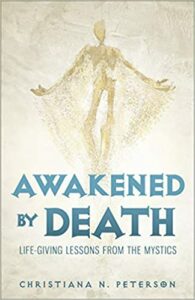 Awakened By Death: Living Giving Lessons from the Mystics Christiana N. Peterson (Broadleaf Books) $24.99 OUR SALE PRICE = $19.99
Awakened By Death: Living Giving Lessons from the Mystics Christiana N. Peterson (Broadleaf Books) $24.99 OUR SALE PRICE = $19.99
Kudos to Broadleaf for publishing this great writer in a sturdy hardback, even if it is a topic and title that might be off putting to some. But why should it? We’re all going to die, right? And many of us have great appreciation for genealogies, the past, history – okay, cemeteries; that’s where this is going. Christiana says on the first page that she loves graveyards. And, man, there’s a lot to be learned from the inscriptions of headstones and much to ponder about life lived in light of the realities of death. Ashes to ashes, Memento mori.
Awakened by Death sounds like a very good one for Lent.
I’m very eager to read this — in part because there is nothing quite like it that we know of (“immersed in a holy awareness of our mortality”) but also because we know that Ms. Peterson is a great writer. We adored her well-written memoir Mystics and Misfits that both told of her involvement (with her husband and children) in a rural, intentional Christian living community alongside her own discovery of medieval saints, especially the one named Francis. If this book is even half as engaging and insightful and honest and moving as Misfits… it is going to be unforgettable.
I am glad this book is said to be about “how God can be found even in dying, loss, and grief.” In these days when so many of us have been touched by Covid-related deaths, when it feels like the plague or black death all around our nation and world, it could be useful to learn from those who found God in the middle of those legendary cultural tragedies.
I adore the books about funerals and undertaking by the master writer Thomas Lynch. I’m still dipping in to last year’s anthology of his writing called The Depositions: New and Selected Essays on Being and Ceasing to Be. If Christiana Peterson’s Awakened by Death brings us clarity about anything close to the topic the way Lynch does, it will be a great read and good addition to libraries about death and dying. I find it promising that the publisher says this about it:
Fear of death is nearly as inevitable as death itself, so we have used modern medicine and the funeral industry to create an ever-increasing distance between us and our mortality. But these interventions have stripped death of its mystery and mysticism. Taking readers on a journey through history, guided by the mystics, Awakened by Death shows us how our psychological and spiritual relationship to death has changed over time, and helps us to reclaim a healthy engagement with our own mortality. Ultimately, readers will gain a deeper understanding of how facing the fear of death, and embracing rather than eschewing its mysteries, can help us live richer, fuller lives.
I like the good words about it written by Christine Valter Paintner, who says:
This is an important book. In a culture that desperately tries to deny mortality, Christiana N. Peterson offers us a gift and an invitation. She presents an ambitious journey through history to follow the path of an impressive array of ancient and modern mystics who knew that death could be a sister or a friend. These stories, paired with her own personal ones, bring the reader on a pilgrimage of the heart and, ultimately, toward a deeper cherishing of life.
I admire the writing of Kelly Nikondeha, who recently wrote Defiant: What the Women of Exodus Teach Us About Freedom. What a book that was! She says this book could bring us not only less fear, but “resurrection goodness.” Listen to this by Nikondeha:
You will be better prepared to walk through the valleys and vistas of life after reading Awakened by Death. Christiana N. Peterson is a gracious guide through graveyards and dark places, ultimately moving us toward the light where we can live with less fear and more resurrection goodness on this side of eternity.
And this good endorsement by Andrew Peterson, the singer-songwriter, author of the kids’ fantasy series The Wingfeather Saga, and founder of Rabbit Room, is really worth reading. I like that he says this:
“For as long as I can remember, I have felt more unsettled by our modern culture’s discomfort with death than by death itself. That’s why I’m grateful for this book, which is less of a cold, hard look at the specter that haunts us all, and more of a gently guided walk through a lovely old cemetery. Peterson’s done her homework and has a lot to teach us about the way Christians through the ages have reckoned with the ticking clock of our own lives. Yes, Christ conquered death-all the more reason to look it fearlessly in the eye and ask what it has to teach us about life.”
 Wait With Me: Meeting God in Loneliness Jason Gaboury (IVP) $16.00 OUR SALE PRICE = $12.80
Wait With Me: Meeting God in Loneliness Jason Gaboury (IVP) $16.00 OUR SALE PRICE = $12.80
When this came out right before the Covid pandemic last spring, I kept wanting to tell people about it; many folks became deeply lonely as we quarantined and sheltered in place. Many of us – if we are being as careful as we should be – most likely are struggling with this yet today. I know we are.
A month ago we highlighted and recommended a very good new book on loneliness and we had a number of folks order it from us. More than I expected, actually, and I know at least one group that I respect a lot is using it for a study. It is called The Great Belonging: How Loneliness Leads Us to Each Other by Charlotte Donlon (Broadleaf Books; $16.99) and it deserves being mentioned again. In that previous BookNotes shout out I noted how very interesting and helpful it is, and how many good writers endorsed it heartily – Karen Swallow Prior, Lauren Winner, Marlena Graves, David Zahl. She is a spiritual director and offers good ideas for “transforming loneliness into true belonging.”
For some reason, it feels to me that Jason Gaboury’s fine book Wait With Me, is, alongside of Donlon’s, a very good Lenten read. It seems almost to have a tone of lament, a deeper spiritual discernment of the culture’s brokenness and our deeply human condition of alienation; it names the isolation we feel (even though it was written before Covid.) As my friend Jonathan Walton (Twelve Lies that Hold American Captive) wisely said about it, “This book is not a roadmap how to escape something that is core to being human, but a testament to how rigorous engagement with loneliness can free us to live more fully as people made in the image of God.”
It is not a roadmap how to escape. It certainly does not do an end-run around or a pious cover up of our loneliness. It does invite us to a deeper awareness of God’s presence in our affliction and to know Christ in his own solitude and sorrow. The title, you will recall, is a line from Jesus Himself in his own time of sadness. Man, this is Lenten stuff, right there, isn’t it?
Listen to what Jamie Smith says about it:
“This, thankfully, is not a book that promises to solve loneliness. It’s not a how-to guide for ‘getting out there’ or a formula for ensuring God will erase your sense of isolation. This book is something very different: a poignant, wise, at times searing invitation to attend to our loneliness as a call from God. This is spiritual writing that is at once urgent and patient, honest and inviting.”–James K. A. Smith, Professor of Applied Reformed Theology and Worldview at Calvin University, author of On the Road with Saint Augustine
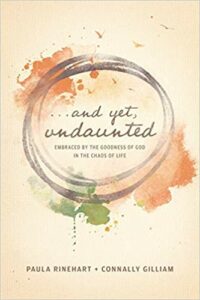 …And Yet, Undaunted: Embraced by the Goodness of God in the Chaos of Life Paula Rinehart & Connally Gilliam (NavPress) $15.99 OUR SALE PRICE = $12.79
…And Yet, Undaunted: Embraced by the Goodness of God in the Chaos of Life Paula Rinehart & Connally Gilliam (NavPress) $15.99 OUR SALE PRICE = $12.79
We awarded this one of our Best Books of 2019 Award last year (you can read my longer review here.) So it’s a really good one! I loved it then and mention it now in part because of the wisdom and down to Earth sisterly sort of advice these women offer.
Both authors have written well about basic sorts of evangelical discipleship, especially for women. This recent one is written in short devotional-like chapters and would be ideal for working through in this complicated season. It gives us words to use that are generative and what we need right now.
You may know that there has been a bit of a shift in the frame of understanding of faith and discipleship in recent years, a shift we have promoted for decades. It has been shown that the Bible is an unfolding drama with a coherent (if circuitous) plot. There is an over-arching narrative, a trajectory; it is, as they say, a narrative.
It is also observed that we live our lives in light of a story that captures us – we make our decisions and find meaning in light of some overarching plot we think we are in. Naturally, then, our own story ought to be shaped by the Biblical story what Lesslie Newbigin called “the true story of the whole world.”
Calling the Bible (and our life formed by it) a story is heard in recent titles like The Drama of Scripture: Finding Our Place in the Biblical Story or God’s Story, Our Story, or The Story of God, The Story of Us. It’s a good trend to see the Bible as something other than a repository of doctrine or a bunch of disconnected episodes, let alone a rulebook. There is a redemptive storyline to the Bible and the only way to read God’s Word well is to see that Big Picture. And the only way to follow Jesus as agents of His Kingdom is to see our lives unfolding as part of His ongoing mission to complete the redemptive plot. It is one of the chief tasks of our churches, I’d say, is to invite people into the life of a community that sees itself as a part of this Biblical story. In Christ, we become actors in God’s redemptive adventure, and what an epic story it is.
Enter Rinehart and Gilliam and And Yet, Undaunted who help us frame our own lives in light of the four major themes of the plot of Scripture, the “acts” of the drama, so to speak. From Al Wolters to Marva Dawn to N.T. Wright and to so many others, we have seen the key high-points of salvation history to be (a) the act of God forming a good creation with humans bearing the image of God, (b) the radical fall into sin and rebellion and dysfunction, (c) the decisive promise and accomplishment of redemption in Christ, (d) and the future hope of “all things restored.” Get it? Creation-fall-redemption-restoration: those are the major “acts” of the Biblical drama.
Creation/fall/redemption/restoration is, in fact, the organizing structure of our Jubilee Conference held out in Pittsburgh (virtual this year, so you can easily attend) that each February invites college students to “live a better story” by entering into that on-going drama.
Rinehart and Gilliam tell that story in a lovely, fresh way in the four units of their book. They allow the big picture of God’s Biblical plot to inform how we understand our daily lives, our personal hurts and fears, and how to learn to trust not only that God is good, but that God is up to something good: the fulfillment of His promises to renew and restore the cosmos. Our daily lives find health and hope by placing ourselves between the creation and the new creation, in the plot that moves from the garden to the city. Christ’s “new creation” work in Jerusalem, on the cross, through the resurrection, is at the very heart of this big story so this season of the church calendar isn’t merely one for beating our selves up or being extra punctilious about spiritual tings. It is about living into the heart of the gospel story in all its vast hope.
It is explained in And Yet… that we as people are good, part of God’s very good creation, but we are hurting, not as we were meant to be because of our complicity as rebels in this fallen and distorted world. Christ has brought us back to life and redeemed His beloved creation, but yet the hopeful end is not yet seen. We walk by faith into the newness of life, realizing that the Kingdom is already but not yet.
And Yet, Undaunted easily gets at the creation-fall-redemption-restoration worldview story and helps us frame all of our lives — all of our sorrows and all of our successes and joys — within the context of this big, true, Story of God.
And here is how they do it — this is amazing and unlike any book on the market. Read on, please!
These authors transpose the words “creation”-“fall”-“redemption” and “restoration” into phrases that were coined by the super smart worldviewish consultant (of the Clapham Institute in Annapolis, MD) Mike Metzger. Namely, their four units are:
- What Ought to Be (Creation)
- What Is (Fall)
- What Can Be (Redemption)
- What Will Be (Restoration)
The chapters are almost devotional in nature, with lots of Bible-based encouragement to live into this “ought-is-can-will be” framework. This slant, this take, this narrative, this Story is how to get the Biblical worldview into your bones and into your imagination. Bruce Hindmarsh of Regent College in British Columbia explains the value of this, how the language of this very book can help us name and make sense of our life and times, in this “beautiful but broken” world:
This book exposes our longings for a better world and then points us forward to the way things can and will be redeemed by Jesus Christ. Because of that, we can live realistically and joyfully – even undaunted – in this beautiful but broken world. Sharing openly about their own lives, Paula and Connally invite us to do the same and live not our best life not, but our real life now.
Cherie Harder of The Trinity Forum writes about it so well:
This wise, beautiful book will undoubtedly serve as a guide and friend through the dark valleys of life, a balm and a spur to those weighed down with regret, disappointment, and unmet longing. And Yet, Undaunted shows the possibilities of finding courage and joy in your life story, by pointing at the Larger Story – what ought to be, what is, what can be, and what will be – and the ways in which Love himself unites the plot and pervades each scene.
Listen to Vaneetha Rendall Risner (The Scars That Have Shaped Me) who says:
Connally and Paula’s writing makes my heart ache – ache for the way things ought to be and ache for the way things will, one day, be – all while dignifying the longing, disappointment, and suffering wrapped up in the now. I am so grateful for these two women: for their wisdom, honesty, and call to hopeful courage. This book will faithfully point you to Jesus as you are drawn in to engage with the deep longings and questions rumbling inside your heart.
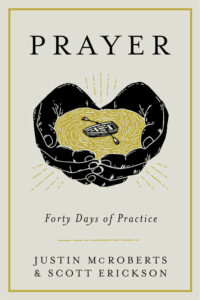 Prayer: Forty Days of Practice Justin McRoberts & Scott Erickson (Waterbrook) $16.99 OUR SALE PRICE = $13.59
Prayer: Forty Days of Practice Justin McRoberts & Scott Erickson (Waterbrook) $16.99 OUR SALE PRICE = $13.59
May It Be So: Forty Days with the Lord’s Prayer (Waterbrook) $16.95 OUR SALE PRICE $13.59
I was talking on the phone the other day to my good friend Justin McRoberts and recalled how I suggested these in previous Lent lists. It just seemed really useful and people were so surprised to realize how artful and creative they were.
These two books are perfect for a Lenten practice for those who don’t want too much study or too many words. Some of us, especially we who love books, maybe have read enough books about how to pray and just need some help to get to it, honestly. For newer BookNotes fans, they may not know these remarkable books of edgy contemporary art and brief reflections designed to stir you to pray. This really is about connecting with God for 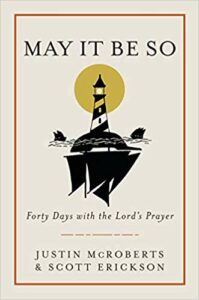 the sake of the world and is done with images and words that combine to form a remarkable window into deeper intimacy with God.
the sake of the world and is done with images and words that combine to form a remarkable window into deeper intimacy with God.
There is nothing like these, believe me, and many of found them fabulous, evocative resources. We’re glad both singer-songwriter/speaker Justin and visual artist/writer and speaker, Scott will both be presenting at the (virtual) Jubilee conference again this year. Both books are highly recommended.
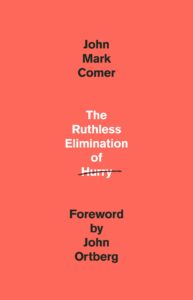 The Ruthless Elimination of Hurry John Mark Comer (Waterbrook) $23.99 OUR SALE PRICE = $19.19
The Ruthless Elimination of Hurry John Mark Comer (Waterbrook) $23.99 OUR SALE PRICE = $19.19
Yes, again and again, I tell about this. Here was one of my first reviews of it in which I described it and recommended it. As Comer puts in his fabulous podcast, it captures something of our “cultural moment.”
It is zippy to read, written by a hip young pastor, a cool writer, a leader who was on the crispy cusp of burnout who was seeking advice, we learn, from Dallas Willard about spiritual formation. This is his telling of what he learned from Willard’s famous answer. It has been one of the most popular books of last year and we are glad to suggest it again, now, in this season to consider our pace of life and our desires to take on the easy yoke of Christ. Not dense, to very useful in this time when we are called to recommit to being intentional about our habits.
How about giving up hurry for Lent? This can help.
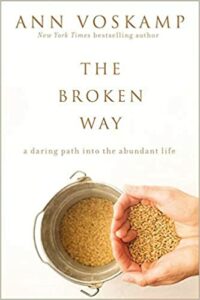 The Broken Way: A Daring Path into the Abundant Life Ann Voskamp (Zondervan) $22.99 OUR SALE PRICE = $18.39
The Broken Way: A Daring Path into the Abundant Life Ann Voskamp (Zondervan) $22.99 OUR SALE PRICE = $18.39
Many people loved the best-selling first book of the lovely, passionate writer Ann Voskamp, One Thousand Gifts: A Dare to Life Fully Right Where You Are. It is a beautiful book looking at the goodness of the world and how to find God’s presence in the many gifts around us. This one, a flip-side sequel, so to speak, to put in simply, looks at other sorts of gifts, the hard ones, the broken and painful things, God’s call to get real about what seems to be unpleasant stuff. What do we do with our “unspoken broken”? How can we be honest about these gritty things in ways that might be transformative? Voskamp is a passionate writer and many adore her honest storytelling and realistic (but, in a way, visionary) sense of how to live in this “broken way.”
Important, eloquent, trustworthy authors like Philip Yancey and Eugene Peterson and Christine Caine have complimented Voskamp’s writing and wisdom. Max Lucado mentions her “skill with words” and “her tenderness with hearts.”
This handsome hardback would be a good book to curl up with and read slow only in these days of winter as we move towards spring. The fourteen chapter titles themselves are allusive and inviting, evoking in many the desire to do this work, go on this journey, allow love to break us and heal us. There is, by the way, a very nice DVD curriculum, too.
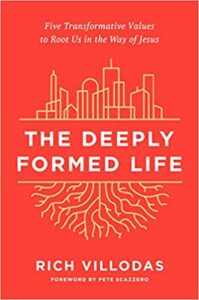 The Deeply Formed Life: Five Transformative Values to Root Us in the Way of Jesus. Rich Villodas (Waterbrook) $24.00 OUR SALE PRICE = $19.20
The Deeply Formed Life: Five Transformative Values to Root Us in the Way of Jesus. Rich Villodas (Waterbrook) $24.00 OUR SALE PRICE = $19.20
This book has really caught on within a number of our circles and it is a delight to see this New York Latino, a pastor from Queens, get so much attention for his first book. It is missional, visionary, an energetic invitation to make a difference in the complex and challenging world of crisis in which we live, all by being, firstly, shaped by the person of Jesus. Which shapes us into being the kind of people who can walk in his ways. Talk about a book appropriate for a Lenten journey!
Villodas is clear and upbeat, energetic and a good writer. This is the best of what evangelical piety can look like – Christ-centered and oriented to action in the world. And he does what action. The book is about being “deeply formed” so we can be on that rugged way of service.
I want to mention, briefly, that I do not know many books that are about spiritual disciplines, our interior lives, inviting spiritual transformation that have as one of the key spiritual priorities to grapple with racial justice. Although it should be obvious, racism is (as Dr. King often said) not only an ideology that hurts people of color but damages the soul of the racist. Rev. Villodas offers us a guide to wholistic transformation, including – alongside more expected practices like contemplative rhythms, interior examination and such – an honest appraisal of our commitment to be anti-racist.
We are, he realizes, exhausted and superficial, divided and distracted. We have a confused sexual attitude that splits bodies from souls; wow can we reject unhealthy compartmentalization? The Deeply Formed Life is a great book to read with others, but if you can’t, pick it up and start through it on your own. It’s okay if you don’t agree with all of it or if his convictions and missional approach aren’t all your own. It’s a fabulous guide to get us going in the right direction with lots of stories and lots of healthy insights.
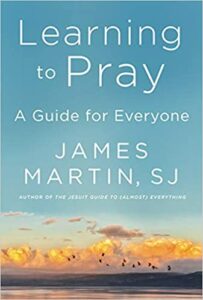 Learning to Pray: A Guide for Everyone James Martin (HarperOne) $27.99 OUR SALE PRICE = $22.39
Learning to Pray: A Guide for Everyone James Martin (HarperOne) $27.99 OUR SALE PRICE = $22.39
What a classic topic to explore during Lent – your prayer life. We have to list this brand new one even though I haven’t looked at it much at all. I stayed up to watch Father Martin, a really funny and super smart Jesuit (aren’t they all? Smart, I mean) on Colbert and it could have been a slightly edgy 700 Club episode. Neither Colbert nor Martin apologized to their public audience or were squirrely about talking overtly as Christians. They just went ahead and talked honestly about a Christian spirituality of prayer, why it matters, how to start, what to say, how to listen to God, whether we should use prayer aids like the rosary, etc. etc. It was really refreshing and reminded me of the older days when Colbert would Martin on as his spiritual director. The two have been friends for a long time.
This book carries weighty and gushing endorsements by Catholic writers like Mary Karr and clerics like Bishop Robert Barron and mystics like Joyce Rupp and Ronald Rohlheiser, as well as activists like Helen Prejean. Even Rowan Williams has a rave commendation. And I Iove that they brought Kathleen Norris into it, as she says “this delightful book is truly for everyone.” This is a hefty book, a major release of the season. 20% off, too of course.
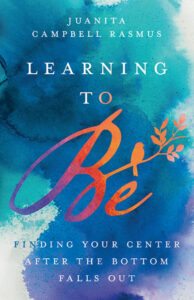 Learning to Be: Finding Your Center After the Bottom Falls Out Juanita Campbell Rasmus (IVP) $22.00 OUR SALE PRICE = $17.60
Learning to Be: Finding Your Center After the Bottom Falls Out Juanita Campbell Rasmus (IVP) $22.00 OUR SALE PRICE = $17.60
This is a very moving volume of contemporary spiritual wisdom written beautifully, nearly as a memoir. Juanita Rasmus is a lively African American woman involved in ministry with her husband, Rudy (also a vibrant author), in United Methodist church in downtown Houston. She has been a spiritual director and travelled with Richard Foster’s Renovare ministry. (She has, in fact, spoken to a Renovare gathering here in central PA and those who heard her were just in awe.)
Learning to Be talks about what Juanita calls “The Crash.” You can imagine – part nervous breakdown, part “major depressive episode” part dark night of the soul. And yet, when her life came crashing to a halt, she found she “had to learn to be – with herself and with her God – all over again.”
Maybe like her you may be a perfectionist, a “good” Southern woman, a ministry leader, a driven workaholic, coping with shame and too, too busy. But, like her, perhaps you have felt overstressed and empty and need to learn to just be.
Richard Foster writes that he has known Juanita Rasmus for many years and admires her greatly. He says:
This is a book of genuine substance dealing with the most heart-wrenching needs of the human soul. I recommend it highly.
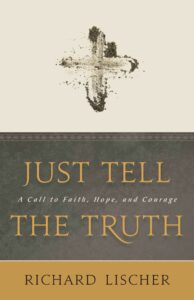 Just Tell the Truth: A Call to Faith, Hope, and Courage Richard Lischer (Eerdmans) $24.99 OUR SALE PRICE = $19.99
Just Tell the Truth: A Call to Faith, Hope, and Courage Richard Lischer (Eerdmans) $24.99 OUR SALE PRICE = $19.99
Eerdmans is such an important, storied publishing house and they are known for exceptionally scholarly volumes of Biblical studies and theology and other serious tomes of social and cultural criticism. They also have books that are more oriented towards the popular reader, a reader that might be the nearly ideal caricature of a Hearts & Minds customer and BookNotes fan — thoughtful, a bit literary, ecumenical, open-minded but deeply serious about faith, educated but mostly not working in academia, committed to the life of the local church. Most of us want books a cut above the average – intellectually stimulating but not dry, Biblically and theologically astute but not strident, creative and lovely without being too weird. And, once again, Eerdmans comes through with a book that should be very widely read and truly enjoyed. Just Tell the Truth is a collection of sermons that many of our customers will surely appreciate. It will delight your reading palette with solid, interesting, enjoyable meat with just a bit of spice.
Richard Lischer is a very good writer. We have often promoted his memoir about being a small town Lutheran pastor (Open Secrets) and his story about his family’s grief upon the death of his son (Stations of the Heart.) He has a major book about Martin Luther King’s preaching and I adored (and still recommend) his book about preaching called The End of Words. His study of the parables in the New Interpreters Commentary series is very highly regarded. We have ‘em all.
I have not looked at this brand new one yet – it just came! We had ordered a bunch in anticipation. I trust it will be excerpted in places like The Christian Century, at least so some of our customers will hear more about it soon. With rave reviews on the back from Barbara Brown Taylor and Will Willimon – who calls it “evocative, creative, demanding beguiling, and faithful” – it should be widely read. Let’s hope so.
At the heart of the book seems to be this question: “what does it mean to live the Christian life with conviction.” Pastor Lischer is showing us his love for preaching, insisting that these verbal works of art can help us understand why they gospel matters. Stanley Hauerwas says he does so “with searing honesty.” He continues, “God knows we need examples of sermons that avoid the sentimentalities of our culture, and this book does just that.”
Here are the section titles, each offering a good handful of sermons
1. Season of Suffering
2. Waiting in Hope
3. Triumph
4. The Life of Faith
5. People: For All the Saints
6. Public Callings
William Barber says:
Richard Lischer plumbs both deep traditions and urgent contexts to remind us that it is when the ancestors speak strongest through the preacher that she or he unfurls the most original and creative visions.
Donyelle McCray of Yale Divinity School writes,
This luminous volume erases any doubt about the sermon’s capacity to cheer the heart. With striking immediacy, God’s word emerges as salve, compass, catalyst, and joy.
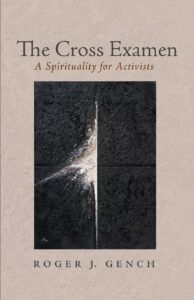 The Cross Examen: Spirituality for Activists Roger J. Gench (Cascade Books) $20.00 OUR SALE PRICE = $16.00
The Cross Examen: Spirituality for Activists Roger J. Gench (Cascade Books) $20.00 OUR SALE PRICE = $16.00
I only have only just discovered this book that was released late in 2020 – we hope to have more in soon. I’m excited about it. It is slim but potent, beautifully rendered with powerful stories. Gench served as Senior Pastor of the famed New York Avenue Presbyterian Church in Washington DC and now is “Theologian in Residence” at Second Presbyterian in Richmond and an adjunct faculty member of Union in Richmond. Several years back he wrote a well-received book about urban ministry called Theology from the Trenches.
This recently released one, as the title suggests, explores “the essential relationship between spirituality and activism” but it does so – get this! – with a robust political theology of the cross. That is, both contemplative practice and social activism should bear “the same cruciform footprint” and are thereby integrally connected. There are shades of Michael Gorman’s work here and yet he goes farther in ruminating about the connection between Christ’s cross and the “other crosses” that illustrate the pains and brokenness of our world, both personal and public.
I cannot think of a book I have seen that is quite like this. He looks at the cruciform life and explores it even in specific Biblical books (a whole chapter on Galatians!) and he does this with an eye to discipleship that is both interior and public. The whole second half offers practices for spiritual formation all the while it explores the fruits of the spirit at applied to the political turmoil of our era. The fruits of the Spirit for public life? Wow.
Read this blurb on the back cover:
There is no better time for religious leaders to learn how to pray than in the challenging and unpredictable times in which we are living. There is also no better spiritual guide and teacher than seasoned activist and pastor Roger Gench. If you are looking for a resource that will provide you or your study group with life-sustaining contemplative practices that you need to turn away from the violence and polarization so endemic in our times and toward neighbor, nature, and God, you have found it in The Cross Examen.” –Elizabeth Hinson-Hasty, author of The Problem of Wealth: A Christian Response to a Culture of Affluence
By the way, the striking art piece on the cover is called “Death” by Dutch painter Anneke Kaai.
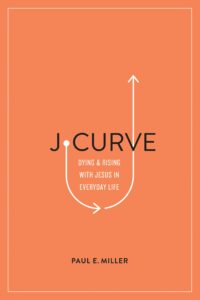 The J-Curve: Dying & Rising with Jesus in Everyday Life Paul E. Miller (Crossway) $22.99 OUR SALE PRICE = $18.39
The J-Curve: Dying & Rising with Jesus in Everyday Life Paul E. Miller (Crossway) $22.99 OUR SALE PRICE = $18.39
In my list last week I highlighted two books that offered very clear-headed and theologically solid descriptions of our union with Christ and with the work of the cross of Christ. Both were by a very thoughtful mainstream evangelical writer, Rankin Wilbourne, and received my warmest recommendation. Thanks to those who ordered them.
This book which we have described before at BookNotes might be in a similar sort of style and approach, a book which has practical application – some might say it is pastoral – by appropriating major and heavy theological themes to ordinary living. This is not in the genre of mystical spirituality nor is it abstract, heady theology. This is detailed Biblical teaching applied to the foibles of our character. In this one – somewhat akin to the messages of Wilbourne – we are invited to think about how the very pattern of Jesus (dying and rising) is a pattern of our own lives. We go down, down, down in recognition of sin. We struggle and – according to the Scriptures – die with Christ. But in dying, like Christ, we arise anew. Hence, the J-curve of the title and the illustration on the cover. Can you imagine your life patterned like a J?
Paul Miller is known for a beautiful book about loving others well; he has a book about Ruth, and is most known for The Praying Life. (And there is a new book about his father, Cheer Up! The Life and Ministry of Jack Miller by Michael Graham to which Paul wrote a lovely foreword about learning about the doctrines of grace from his famous father.)
The J-Curve: Dying & Rising with Jesus in Everyday Life, though, is a tad deeper and more complex than anything he has done before. But for those who work through it, The J-Curve and its solid framework (“a map of the Christian life” he calls it) for thinking about our Christian growth. I hate to use the fancy pants word, but it is, I’d say, a book that moves from justification to sanctification. It does not conflate the two, but it does show the similar processes. It names our sins and daily hurts, our failings and pains, and it offers the hopes and joys of what the old Lutheran liturgy calls “the newness of life.” It is, finally, a book about transforming grace.
This book takes the creedal teaching and liturgical habit of confession and renewal into the realm of daily living and real Christian growth. It tethers our transformation to Christ and his cross and resurrection. It tethers our daily hurts and sadness to Christ’s own. Can you think of a better theological book to study during Lent?
Here is what Joni Eareckson Tada (a family friend of the Millers) says of it:
‘Take up your cross and follow me.’ What was Jesus asking us to do — or be? How does it play out in everyday life? These questions are intensely practical from the moment I wake up in the morning. And that’s why I love Paul Miller’s new book, J-Curve: Dying and Rising with Jesus in Everyday Life. Never have I read a more practical work on how a Christian can flourish through deep affliction. This book will revolutionize the way you look at your sufferings and your relationship to Christ. If you’re craving a life with your Savior that utterly transforms, this book is your best hands-on guide.”
—Joni Eareckson Tada, Founder, Joni and Friends
And, fun fact spoiler alert for local customers: the story about the owner of an ice cream place who learned to trust Christ more in her own life and work? Visit the DQ out on Route 30 in West York! Even if you don’t buy The J-Curve, you should go there!
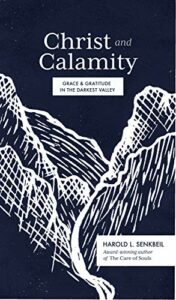 Christ and Calamity: Grace & Gratitude in the Darkest Valley Harold Senkbeil (Lexham Press) $9.99 OUR SALE PRICE = $7.99
Christ and Calamity: Grace & Gratitude in the Darkest Valley Harold Senkbeil (Lexham Press) $9.99 OUR SALE PRICE = $7.99
I’ve long liked the alliteration of “grace & gratitude” and I appreciated the very handsome, award-winning book on deeply theological and spiritual pastor care written by Rev. Senkbeil (The Care of Souls: Cultivating a Pastor’s Heart) just a few years ago. So when this pocket sized, but very handsome and well designed little paperback came out, by this same author, we bought a bunch sight unseen. Later, it won a Christianity Today book of the year award and that re-confirmed in my mind that this was well worth having.
This little essay is pastoral balm based on what some call “the great exchange” – our rags replaced by Christ’s righteousness; our guilt, His grace; our hurt, His hope. The frightened disciples in the boat cry out, “Lord, do you not care if we perish?” In the midst of suffering and uncertainty, Senkbeil says, we’re all prone to think that God has forgotten us.
This little volume does not explore all the hard nuances of theodicy. It isn’t comprehensive and isn’t going to assuage the horror of some who are in deep distress. But for most people, it seems, this good sermon that Christ is mighty to save, that He wills our good, that in all things God is with us, will be a great blessing.
As Lexham sometimes does, there are black pages with enlarged white print, pull quotes with that reverse printing look. It is visually striking and an expense and artfulness they put into the design that gives the book the gravity it deserves. The author is a theologically conservative Lutheran and offers time-honored, classic truth for those who need a word of prayerful comfort during time of affliction.
There are a few short prayers and litanies in the back, too, and a couple of lyrics to old hymns. Mature, good stuff.
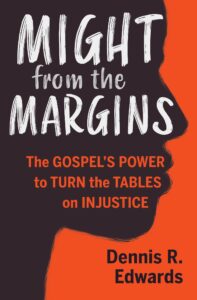 Might from the Margins: The Gospels Power to Turn the Tables on Injustice Dennis R. Edwards (Herald Press) $16.99 OUR SALE PRICE = $13.59
Might from the Margins: The Gospels Power to Turn the Tables on Injustice Dennis R. Edwards (Herald Press) $16.99 OUR SALE PRICE = $13.59
This is another book we have promoted and if we were out doing off-site book events we’d be showing it off and hand-selling it. It is a remarkable, easy to read book – Jim Wallis calls it “a powerful” and “inspiring” and it surely is. We’ve followed Dr. Edwards’s work for years (and I have used his Story of God: 1 Peter commentary.) He is a professor of New Testament at North Park Theological Seminary and author of What is the Bible and How Do We Understand It in the little “The Jesus Way” series published by Herald Press.
As I considered what books I might highlight here that seemed useful for this time in our year – culturally, socially, and liturgically – it seems that Might from the Margins would be ideal. Like other Lenten themes, this calls us to downward mobility, so to speak, to servanthood and giving up privilege. It includes a call to the margins, to listen well to those who have been ignored or marginalized. Indeed, Edwards shows that this is at the heart of much of the Biblical narrative. The power of the gospel is the key to the story – that is, not human power. The Bible shows God working in history, unfolding God’s own purposes. Might form the Margins is designed to show how God uses the power present within marginalized communities but it does so by documenting this in the Bible itself. As it says on the back, “God has empowered marginalized Christians to transform the church.”
Here is the quite wonderful titles of each of the chapters in the table of contents:
The Power of God, The Power of Diaspora People, The Power to Discern Injustice, The Power of Prophecy, The Power of Anger, The Power of Solidarity, The Power of Worship, The Power of Hope, The Power of Spirit, The Power of Love.
Drew Hart of Messiah University and author of the must-read Who Will Be a Witness: Igniting Activism for God’s Justice, Love, and Deliverance, writes that it is, “A compelling vision forward, grounded in Scripture and God’s delivering presence for those with their ‘backs against the wall.’” Right on!
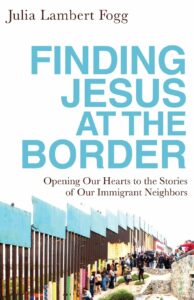 Finding Jesus at the Border: Opening Our Hearts to the Stories of Our Immigrant Neighbors Julia Lambert Fogg (Brazos Press) $17.99 OUR SALE PRICE = $14.39
Finding Jesus at the Border: Opening Our Hearts to the Stories of Our Immigrant Neighbors Julia Lambert Fogg (Brazos Press) $17.99 OUR SALE PRICE = $14.39
I suppose it isn’t my best strategy to try to sell books to our friends and good customers by making readers feel guilty. But, alas, it is nearly Ash Wednesday and we nearing Lent so it is time for us to all get honest about our sin which includes complicity in this awful world of sin and violence. I suspect that most of us were heartbroken to learn, if we did not know, that the Obama Administration had a fairly brutal policy when it came to immigrant children at the Southern border. And it was excruciating to know that President Trump’s administration, with lots of loud so-called “Christian” backing, put children in what resembled cages, tore mothers and children apart, had sloppy and cruel policies that devastated families, tore them apart and lost track of some of the separated children. That groups like Tony Perkins’ so-called pro-family organization supported these policies that hurt children is beyond flabbergasting. That most of us cared sincerely but didn’t know what to do is, if we are honest, also vexing. We are all implicated.
And so, for Lenten penance, I suggest we read something like this. We have more than a dozen others on this topic and we commend everything from the best-selling novel (that I could not put down, harrowing as it was) American Dirt by Jeanine Cummins to the real life story of the terrible train ride by Sonia Nazario, Enrique’s Journey: The Story of a Boy’s Dangerous Odyssey to Reunite with His Mother to IVP’s riveting Separated by the Border: A Birth Mother, a Foster Mothers, and a Migrant Child’s 3,000 Miles Journey by Gena Thomas to any number of New York Times best sellers or the many theological studies we stock on this topic. Pick something that will get you in touch with our hard hearts and our frustrating sense of incapacity. Finding Jesus at the Border, is a good start.
Getting to hear the stories, meeting the people, and helping us see the Biblical correlation, is the goal of Finding Jesus at the Border, a book called “beautifully written, well-researched, and painfully moving.”
Interweaving biblical narratives of border crossing and stories of immigrants journeying to the United States today, this recent work invites us during this season of repentance to reconsider the plight of our neighbors. It calls us to ask WWJD which is a pretty solid Lenten practice, eh? Julia Lambert Fogg, by the way, has a PhD from Emory, is an ordained Presbyterian minister, and teaches religion at a Lutheran University while she works often with congregations near the Southern US border. Her Meeting Jesus… vividly helps us with that classic desire to read the world in light of the Word and to read the Word in light of the world. Highly recommended.
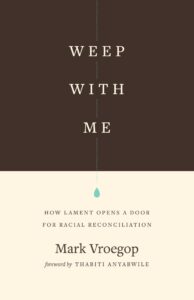 Weep With Me: How Lament Opens a Door for Racial Reconciliation Mark Vroegop (Crossway) $16.99 OUR SALE PRICE = $13.59
Weep With Me: How Lament Opens a Door for Racial Reconciliation Mark Vroegop (Crossway) $16.99 OUR SALE PRICE = $13.59
In a “First Friday” Zoom lecture I did not long ago for friends at Chestnut Grove Presbyterian Church (visit our Hearts & Minds Facebook group page to watch it if you’d like) I was asked a question about trends in the publishing world and things we may have learned in this past hard year. I noted two things that seem to stand out in these past months and that includes a deepening awareness of the role of lament and an honest reckoning with the disappointments and injustices in our world and, of course, the deeper awareness many American’s have, now, about the racism – instructional and otherwise – that still plagues our society (and, in many cases, our law enforcement organizations.) There have been several new books in recent years about lament and many, many about racism. Weep With Me is a solid contribution to both fields, inviting us to lament (Biblically) about racism.
Weep With Me is a book I’ve mentioned before and I think it is very useful. It is written by a white pastor, who is a straight-arrow conservative theologically. It is not edgy or progressive or written by what some dismiss as a social justice warrior. Vroegop is a pastor of an evangelical church who wants to do what the Bible says and what God’s grace demands. An earlier book, last year’s Dark Clouds, Deep Mercy: Discovering the Grace of Lament won a number of awards and seemed to be helpful to many as he invited the use of the Biblical songs and Psalms of lament in personal devotion and public worship. This newer one, Weep with Me, applies that teaching specifically to the topic or racism.
“Gospel unity,” he writes, “creates racial harmony.” Yes. But to truly experience such unison in the gospel we work out our life together as those whoe one in Christ, which at least means learning to “weep with those who weep.”
Those of us from majority cultures simply must listen to the heartfelt agonies of our black brothers and sisters and other people of color. In this good study, pastor Vroegop – who starts the book with an painfully honest admission of his privileged past that kept him from seeing some pretty plain facts in his ministry setting – unfolds how to develop empathy, how we need heart change and a very deep level. He says about the practice of lament, it is “the biblical language of empathy and exile, perseverance and protest.”
At the end of each of the strong 9 chapters there is a sample prayer, written by black, white, Latino, and Asian pastors or leader (mostly men.) Further, there are a few appendices offering samples of prayers of lament.
Here is the table of contents so you can see if this might be useful for your or your congregation or group:
Part 1 Lament in the Bible and History
- Pray: The Language of Lament
2.Listen: Lessons from African American Spirituals
3.Walk: The Bridge of Lament
Part 2 Lament and Majority Christians
- Weep: The Healing Grace of Empathy
- Speak: Ending the Painful Silence
- Repent: Remembering with Remorse
Part 3 Lament and Minority Christians
7.Protest: The Voice of Exiles
8.Triumph: Redeeming the Pain
9.Believe: Dare to Hope Again
Conclusion: Lament: An Open Door for Racial Reconciliation Appendix 1: Psalms of Laments Appendix 2: Learning-to-Lament Worksheet Appendix 3: Sample Civil Rights Vision Trip Itinerary
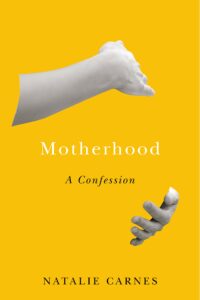 Motherhood: A Confession Natalie Carnes (Stanford University Press) $24.00 OUR SALE PRICE = $19.20
Motherhood: A Confession Natalie Carnes (Stanford University Press) $24.00 OUR SALE PRICE = $19.20
Again, for those who want something substantive and reflective, deep and meaningful to read during Lent but who don’t want a little daily devotional, or anything exactly about Lent, this thoughtful book might be a real companion for your journey this next month or so. That is, if you’re pregnant. (Or, if you’re not. Work with me here, people! It is a book Tish Warren says “combines profound theological depth with astonishing beauty and Jamie Smith calls “a masterpiece.”) Pregnant or not, a mother or not, a woman or not, this is a pretty amazing work.
We were struck by this book the moment we heard about it; I am not sure what we read but it was most likely a short review in Publishers Weekly or an advert in an industry journal. We knew the author had written a book of feminist analysis of Christian art (nursing Madonna’s actually) and teaches at Baylor. Could this book be as interesting as we hoped?
When we got it in the store, we realized it really is exactly a companion to and conversation partner with St. Augustine and his famous Confessions. Jessica Mesman calls it “beautiful” on the front cover, and we were hooked.
Can stuff about pregnancy, birth, breastfeeding and mothering feel Lenten? Yes. And linking it to a spiritual classic about repentance surely makes it apropos. What if Augustine’s Confessions had been written not by a man, but by a mother? How might her tales of desire, temptation, and transformation differ from his? Natalie Carnes “describes giving birth to a daughter and beginning a story of conversion strikingly unlike Augustine’s — even as his journey becomes a surprising companion to her own.”
Turn the book over, and we find rave endorsing blurbs by two good friends, Tish Harrison Warren and James K.A. Smith, who calls it “a masterpiece.” And a great endorsement by the always-interesting Tony Jones.
Here is what they wrote:
Natalie Carnes’ remarkable meditation on motherhood, in conversation with Augustine’s Confessions, is destined to become a classic itself. Her prose is vivid; her insight is penetrating; her honesty is disarming. This is a book that has been waiting 1,600 years to be birthed. Carnes has brought forth a masterpiece. — James K.A. Smith, author of On the Road with Saint Augustine
Parenting can feel terrifyingly lonely, in part because it conjures emotions wholly unique to the endeavor. Natalie Carnes reflects on her own motherhood in this moving memoir alongside the progenitor of the genre, Augustine’s Confession — a risky undertaking, but accomplished brilliantly. Motherhood is a book to be savored. — Tony Jones, author of Did God Kill Jesus? Searching for Love in History’s Most Famous Execution
This book pulls you in and leaves you better for having read it. Natalie Carnes’s meditations on her experience are vulnerable and relatable, yet she gives us so much more than merely another Christian ‘mom book.’ Rich with insights from iconography, scriptural exegesis, and the Church fathers, her work as a mother, a stunningly gifted writer, and a thoughtful theologian combine to give us a gem of a book that often left me in tears. The beating heart of Motherhood: A Confession is the power of a mother’s love, and Carnes’s luminous examination of that love’s complexities, contradictions, and grace drew me into wonder and worship. This is a rare book, one that combines profound theological depth with astonishing beauty. As Augustine’s own Confessions would say, Tolle lege. Take up, read, and savor this book. — Tish Harrison Warren, author of Liturgy of the Ordinary: Sacred Practices in Everyday Life and Prayer in the Night: For Those Who Watch or Work or Weep
 Dinner Party with the Saints Woodeene Koenig-Bricker (Paraclete Press) $17.99 OUR SALE PRICE = $14.39
Dinner Party with the Saints Woodeene Koenig-Bricker (Paraclete Press) $17.99 OUR SALE PRICE = $14.39
Speaking of Saint Augustine (and his own mother, and mistress) they all make an appearance in this utterly charming, fanciful, clever, and very informative and entertaining book. I wasn’t sure if it should be added to a list of heavy books for our complicated times here during Lent because it is written with whimsy and includes some remarkable recipes, crafted by a classically trained culinary artist, Celia Murphy. The last chapter made me weep with its simple reminder of the call to servanthood and kindness, so I knew I had to mentioned it quickly here, now.
This new book offers a handful of components in each chapter. First, the main part of the chapter is fictional as the saint to whom we are being introduced shows up at this celestial dinner party “up there” in heaven. Yep, it’s goofy and romantic with harps and golden streets and these saints realizing that can let go of some of their earthly compulsions – St. John Henry Newman arguing rational theology, Francis Borgia flagellating himself, the other St. Francis over-doing the fasting, as they readily admit in a conversation at the dinner party. (Okay, Newman doesn’t concede, actually.) Yes, each chapter unfolds a part of the story as the guests bring their favorite item to a potluck dinner and observe who all they see there. (They do this potluck thing in America, St. Augustine tells Newman, who finds it exceptionally odd. Ha.) They meet and mingle with clever banter and some self-revelation about their own time and place, fears and foibles, passions and interests. What a hoot!
Next there is a several page non-fiction survey of the Saint in question. This is a remarkable resource for novices to this world.(Koenig-Bricker is the author of 365 Saints, a very popular book in Roman Catholic circles so she knows her stuff.) These 16 sections fill in the facts about the person we met in the fictionalized heavenly banter. Some, naturally, are early saints of the church as mentioned in the Bible, from Martha (who is busy helping organize everything, of course) to St. Peter to St. Lydia of Thyatira to St. John the Baptist (who brings locust to the party, naturally) to St. Martine de Porres to St. Teresa of Avila (with her dancing shoes, which should choke you up if you know about her discalced order) to St. Bridget of Ireland. So many fascinating folks are interacting at this fun dinner party. The factual portions are very interesting as we learn about them all – St. Kateri Tekakwitha (the increasingly well known Native American saint), St. Gertrude of Ivelles, the Korean St. Andrew Kim Taegon (who in the story has his kimchi) and more.
After the fictional conversations and the earnest biographical section, there is another section about the miracles, legends and lore of each saint. There are interesting sidebars and facts and some historical insights. It’s all very interesting.
And then there are the recipes, authentic from the era and location of the famous heavenly conversation partners. There is attention to those who need gluten free diets and there are some that are vegetarian. They look sumptuous and some are not that complex, although a few are perhaps for more adventuresome cooks. This is pretty darn cool, lots of fun, and curiously edifying.
Charming, inspirational, educational, and tasty, this is a lovely book that reminds us that the saints were real people, who worked, slept, prayed, read and ate. Being holy means being yourself, and part of our shared humanity is enjoying a well-cooked meal. I learned a lot about the saints from this book, and also am eager to try some of these recipes!” — James Martin, SJ, author of My Life with the Saints and Learning to Pray
“Here’s an offering that is both factually delightful and delightfully true to the facts. This author has done her homework, bringing into real life stories of a whole panoply of saints, revealing their idiosyncrasies and describing the cultures in which these holy men and women practiced their vocations with holy partying and praying.” — Luci Shaw, poet, author of The Generosity; Writer in Residence, Regent College
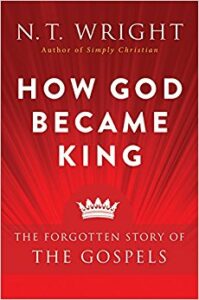 How God Became King: The Forgotten Story of the Gospels N.T. Wright (HarperOne) $14.99 OUR SALE PRICE = $11.99
How God Became King: The Forgotten Story of the Gospels N.T. Wright (HarperOne) $14.99 OUR SALE PRICE = $11.99
I think it was two or three seasons ago that I did a BookNotes list of a few books about the cross. From John Stott’s remarkable The Cross of Christ to Fleming Rutledge’s magisterial The Crucifixion to many old and newer studies, the topic is endlessly generative and serious Christians should regularly read books about this key topic.
One of the books I highly recommended – and still do! – is The Day the Revolution Began: Reconsidering the Meaning of Jesus’ Crucifixion by N.T. Wright (Harper; $19.99.) The premise of that stellar book is that the “end” or goal of the death and resurrection (and ascension) of Jesus is to vindicate God’s promises of offering not only personal salvation for those who believe but to bring about a whole renewal project of the fallen creation. Death and dysfunction – the disordering of the cosmos — is defeated. That is, if the “end game” is a healed or “new” creation, then how should we understand the many references by Paul in the New Testament about the cross? Wright studies each major passage by Paul about the death of Christ and/or the power of the cross in light of the hoped for renewal of all things. It’s a splendid project, and illuminating book.
However, as much as I recommend The Day the Revolution Began, in a way this one, How God Became King, is a prequel to it. It allows us to read Paul in light of Jesus, making clear the gospel-based message and the primary teaching topic of Jesus: that the Kingdom of God is at hand. When we had Tom Wright in the back yard of our store a few years ago he preached on this exact business, joking (as he does in How God Became King) that he could imagine the gospel writers, Matthew, Mark, Luke, and John, protesting our Apostles Creed for skipping right over the biographies they gave us of Jesus’ teaching, stories, work, and life. Yes, “born of a virgin and suffered under Pontius Pilate.” But wait, the apostles insist – we went out of our way to tell about a whole lot of others stuff, his miracles, his parables, his sermons, his confrontations with the religious leaders, his prayers, his promises. What about all that?
One simply cannot understand Jesus, I think, without realizing that the heart of his message is that He is the Messiah of Israel and would bring about, inaugurate, the long-awaited Kingdom of God. On Earth as it is in Heaven. If Paul teaches about the cross as the entryway to the fully consummated new creation, the language Jesus Himself gives us for this is the Kingdom of God.
How God Became King is, for many of us, still, “the forgotten story of the gospels.” We need, during Lent surely, as we move towards the tragic week we call holy and we focus on the horrific trial and cross, to know what it is all about. What is this “revolution” that begins there? N.T. Wright is clear as can be and this book is a great read for any time of year, but especially now.
Don’t miss the three middle chapters under the unit “The Kingdom and the Cross.” He writes about “Where We Get Stuck — Enlightenment, Power, and Empire”, “Kingdom and Cross in Four Dimensions” and “Kingdom and Cross — The Remaking of Meanings.” As always, he moves us towards application, too, as he suggests by the end “how to celebrate God’s story.” Thanks be to God, the suffering King. Please consider ordering some of these for your church, fellowship, Bible study or book club. You won’t regret it!
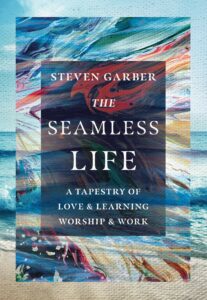 The Seamless Life: A Tapestry of Love & Learning, Worship & Work Steven Garber (IVP) $20.00 OUR SALE PRICE = $16.00
The Seamless Life: A Tapestry of Love & Learning, Worship & Work Steven Garber (IVP) $20.00 OUR SALE PRICE = $16.00
I sincerely lauded this compact hardback before it even came out and, a year or ago, named it one of my very favorite books of that year. I say an even more audacious thing on the back cover where I was honored to insist that it is one of my all time favorite books of this kind. It is true.
Garber’s previous 2014 Visions of Vocation: Common Grace for the Common Good, also published by IVP, ($18.00; our sale price = $14.40) is another exceptionally important book to me that I find myself talking about often. I think it is ideal for Lent, by the way – he takes our being implicated in the fallen systems and injustices of this world very seriously and he 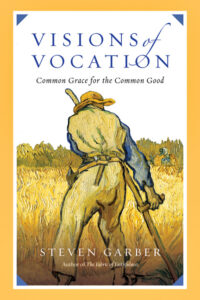 knows (and writes with astonishing beauty) that loving the world as God does is hard, very hard, especially for those who feel the sorrows of things, the pathos. Those of us who carry some of the weight of the world on our sad shoulders need the companions described in Visions of... His tone is morally serious and yet honest about the foibles (and joys!) of such a life given for the sake of the world.
knows (and writes with astonishing beauty) that loving the world as God does is hard, very hard, especially for those who feel the sorrows of things, the pathos. Those of us who carry some of the weight of the world on our sad shoulders need the companions described in Visions of... His tone is morally serious and yet honest about the foibles (and joys!) of such a life given for the sake of the world.
Steve’s collection of shorter posts (complete with lovely, full color pictures) found in The Seamless Life strike me as an introduction to his good writing style – not light and cheery, but certainly not dry or drab – and to his overall vision that our life of discipleship necessarily includes a integrated sense of God’s care for every area of our lives and our sense of His call to serve in every sphere of culture. These luminous, interesting essays are brief but captivating and offer a truly robust vision of the consequences of the gospel being lived out in humane way in all sorts of venues – while watching movies and reading books, in the business world, in farming and in travel, in family life and in politics. Getting to experience his writing style (which is lovely if a bit unique) and his vision, which is deep in his own bones as these reflections indicate, is a joy, if a bit of a challenge. The short pieces really help us become more deeply acquainted with the author and his vision of life.
A Seamless Life is a small but smart book which is ideal for Lent, for a slow careful read. It will make you happy (is that allowed in this liturgical season?) and may make you deeply glad that there are these connections being made – between love and learning, say, or between worship and work, between liturgy and labor – all over the world. He has fanned those flamed, guided and mentored people, reported on that which he sees (sometimes from a bit of a distance, sometimes from quite close up.) His stories about his own life, about those he has taught or inspired, about those he works with, show us what it looks like that the Kingdom is coming. It shows us how to live lives that make sense, coherent and whole.
Many of us lament that our deepest convictions don’t play out in daily life as much as we wish. Few of us are crass dualists – insisting there really is a huge gulf between spiritual things and worldly things – and most of us aspire to a life where what we do on Sunday spills over into Monday. We want to be consistent, living within a fabric of faithfulness. But yet. But yet, we don’t have that many models and stories and examples of those who live so seamlessly they naturally worship at work, love when they learn, see God in everything. Garber’s short essays teach this gently, slowly, not nearly as didactically as I tend to when I preach about such things. He’s got a lovely storyteller’s gift and a good writing style making this book an ideal little volume to read slowly, enjoy, and ponder. Highly recommended!
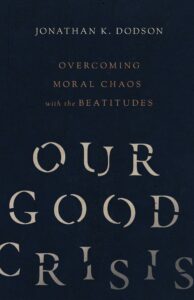 Our Good Crisis: Overcoming Moral Chaos with the Beatitudes Jonathan Dodson (IVP) $16.00 OUR SALE PRICE = $12.80
Our Good Crisis: Overcoming Moral Chaos with the Beatitudes Jonathan Dodson (IVP) $16.00 OUR SALE PRICE = $12.80
I have commented on this before and complimented the good insight and quality writing by this young pastor (founder of City Life Church in Austin, Texas.) I loved a thoughtful but inspiring book he did called Here in Spirit explaining the doctrine and experience of the Holy Spirit; he wrote another called The Unbelievable Gospel He had one about forming missional communities and one called Gospel-Centered Discipleship.
Relatively young, Dodson is perceptive, thoughtful and fully aware that we are living in a culture of crisis. He wrote this book before the Covid pandemic and before the civic chaos of the last months; as I write these comments the President’s awful rhetoric and ugly speeches about his political enemies has been played on national TV as the hearings about the riot at the capitol has lead to even deepening divides in our morally confused age. As the back cover puts it, “We’re confronted with calamity every time we read the headlines.” Yup.
The back cover copy continues: “But behind each of these lurks another kind of crisis, one we find harder to define: a moral crisis – a crisis of goodness. To properly address the crises that plague our world, we must be formed as people of moral goodness.”
This is one of the things I very much appreciated about Dodson’s book. It doesn’t just assert this abstract arguing point that without God we have no ability to measure ethics (an argument that is important to make, I think) and that without a consensus about absolutes we will be forever in a quandary about what is right and good and just. Fair enough, but it’s deeper than just a disagreement about God and truth and right and wrong.
In a way, this deeper moral crisis was the very “line of despair” Schaeffer wrote about as we devolve towards not only incivility and confusion but ultimately nihilism. It seems to me – Dodson does not go here – that the alt-right and Proud Boys and the far anarchist left like Antifada are grasping for meaning in what we call “a secular age.” With extremists acting out, with weirdo conspiracy theories gaining traction, with ideologues breaking into the Capitol and then not knowing what to do other then scream USA! USA!, we are in the throes of a deeper experience of the bankruptcy of our times. Jonathan is so right – we are in a crisis of goodness. Not just that people are not good, but that we don’t have an idea as to what goodness is.
Enter his astute study of the Beatitudes. Could these hard but beautiful words of the Master be a clue, a lifeline, a vision for a life well lived? Can they be, as Dodson puts it, a guide to “flourishing in an age of crisis”?
Look: these are some of Jesus’ most direct teachings and we should read them over and over and then study authors who explicate them, regularly. They are so countercultural and so perplexing we need all the help we can get. We’ve got oodles of different books on the Sermon on the Mount and the Beatitudes on the shelf here. Start with this one.
As missiologiest Allen Yeh puts it,
Pastor Jonathan Dodson poignantly unpacks the perennial truths of the greatest sermon of all time, revealing its ancient wisdom for our morally confused times. Replete with real-world examples, both historical and contemporary, this book offers a compelling countercultural solution to our moral crisis grounded in Jesus’ upside-down kingdom.
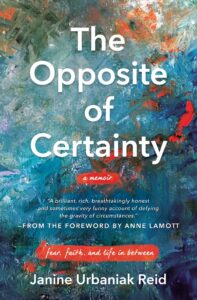 The Opposite of Certainty: A Memoir: Fear, Faith, and Life in Between Janine Urbaniak Reid (Thomas Nelson) $18.99 OUR SALE PRICE = $15.19
The Opposite of Certainty: A Memoir: Fear, Faith, and Life in Between Janine Urbaniak Reid (Thomas Nelson) $18.99 OUR SALE PRICE = $15.19
Back before the virus started spreading we ordered a big batch of these; I love memoirs and when I saw Anne Lamott had a foreword I thought that would be fabulous. (She, by the way, has a book coming out on March 2nd for which we are taking pre-orders. It is called Dusk, Night, Dawn: On Revival and Courage; Riverhead $20.00.) Anne is such a witty writer and I respect her work a lot so if she enjoyed this, we thought we’d review it and take it to some of our off site gigs.
Anne Lamott knows the author Janine Urbaniak Reid from their church (St. Andrews Presbyterian in Marin City) and about The Opposite of Certainty she writes,
A brilliant, rich, breathtakingly honest and sometimes very funny account of defying the gravity of circumstances.
Here is another back cover blurb that pulled me in:
Full of spiritual grace and shining with a kind of rare hope, yes, it brings you to your knees but miraculously shows you that this might actually be the best vantage point to see the stars. Extraordinary. –Caroline Leavitt, New York Times bestselling author of Pictures of You and Cruel Beautiful World
The book does have its funny moments and it covers a wide range of human emotion as this feisty mom experiences them. As one reviewer said, “one day it is doughnuts and hot coffee and the next day it’s gurneys and scans.”
You see, the book is mostly about the author’s coping with her young son having a brain tumor. Oh, and she has breast cancer. There are obviously no easy answers to this kind of stuff and she “searches for a source of strength bigger than her circumstances” and then her circumstances got even worse. Early she penned a piece for the Washington Post that went viral. She became a voice for healthcare justice. Indeed. We thought it might be a good season to read a book about fear and faith. Might The Opposite of Certainty be a memoir for your next book club? 20% off, of course.
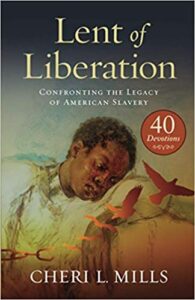 Lent of Liberation: Confronting the Legacy of American Slavery Cheri L. Mills (WJK) $14.00 OUR SALE PRICE = $11.20
Lent of Liberation: Confronting the Legacy of American Slavery Cheri L. Mills (WJK) $14.00 OUR SALE PRICE = $11.20
We just got this in and we’re very eager to explore how this study of slavery and its brutal impact on black people can be used as a Lenten resource for those wanting to deepen their understanding and repentance of this aspect of our American culture. It has forty readings, each linking a true story of narratives by enslaved individuals (drawn from a famous book about the Underground Railroad by William Stillman, written in the 1800s) and an aspect of the legacy of racism.
With each historic reading there is also a Bible text and serious conversation questions for reflection. There is a digital resource available for facilitating personal study or small group discussions. Pastors may want to consider this even for sermon preparation – wwwwjkbooks.com/LentofLiberation.
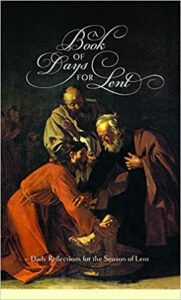 A Book of Days for Lent: Daily Reflections for the Season of Lent edited by Steven G.W. Moore & Fr. Richard Ganz, S.J. (M.J. Murdock Charitable Trust) $17.95 OUR SALE PRICE = $14.36
A Book of Days for Lent: Daily Reflections for the Season of Lent edited by Steven G.W. Moore & Fr. Richard Ganz, S.J. (M.J. Murdock Charitable Trust) $17.95 OUR SALE PRICE = $14.36
This is a book we are honored to tell you about as it is a book that isn’t widely available in many bookstores; it was a labor of love put together by two entrepreneurial thinkers who compiled these reflections in a handsome hardback (with some full color art.) What a joy to have some of these and to get to sell them this season.
Moore is the CEO and Executive Director of the Mudock Charitable Trust which dispenses a large amount of grants to mostly faith-based organizations and ministries doing good, responsible work in the world. We have heard of their philanthropy for years and know a bit about some of the excellent organizations, colleges, camps, advocacy groups, social service agencies, and ministries they’ve supported. The contributors to their Book of Days for Lent are leaders of the missions and nonprofits they support. Many (but not all) are in the Pacific Northwest and each entry is very nicely done.
A few of the contributors are themselves fairly well known – the late, great writer Brian Doyle (of Portland College) is here and, for instance, the aforementioned A. J. Swoboda (at the time pastoring in Portland and working on an environmental ministry called “Blessed Earth.” Our friend Kate Harris has an entry, too. Other authors of the Lenten pieces are camp directors, college presidents, street workers among the poor, folks with jobs as different as running high financial institutions to food banks; from those working with Habitat for Humanity to prison ministries to cultural discernment think tanks. The writers are good folks who do good work, the insights profound, the layout quite nice. That these leaders of culture shaping organizations want to help us “honor Lent” and pulled together this marvelously handsome resource says a lot. We are thrilled to share it with our customers, while supplies last.
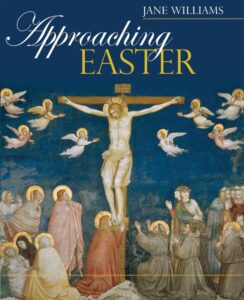 Approaching Easter Jane Williams. (Lion Press) $16.95 OUR SALE PRICE = $13.56
Approaching Easter Jane Williams. (Lion Press) $16.95 OUR SALE PRICE = $13.56
We were so glad to get this in again this year from the UK as it is a lovely, affordable, medium-sized hardback book with great reflections on historic paintings that are excellently reproduced on heavy, bright white paper. This small hardback is a small treasure to hold at 5.5 x 6 inches. You may know that Dr. Williams is a renowned theologian and art historian (she did a book that has been a beloved Hearts & Minds bestseller, The Art of Advent.) Here she blends personal stories, spiritual reflections, and quotations from Scripture) and some other classy sources) to illuminate the art the book shows off. Very nicely done.
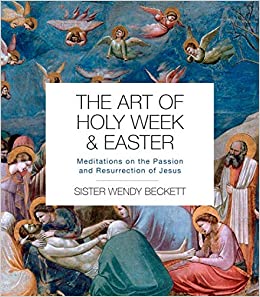 The Art of Holy Week and Easter: Meditations on the Passion and Resurrection of Jesus Sister Wendy Beckett (SPCK) $13.00 OUR SALE PRICE = $10.40
The Art of Holy Week and Easter: Meditations on the Passion and Resurrection of Jesus Sister Wendy Beckett (SPCK) $13.00 OUR SALE PRICE = $10.40
In a few weeks I hope to have the time and energy to list a few books to use during Holy Week. This little volume just came in today and I don’t want to run the risk of not telling you about it, so will gladly celebrate it briefly, here, now. Hooray!
I know you know the aforementioned hand sized The Art of Advent compiled by the aforementioned Jane Williams. The companion volume for that has been The Art of Lent compiled with reflections by the late Sister Wendy. Now, here, we have another in that series of small, fiull color, very, very classy little art books with devotionals for the season.
The Art of Holy Week has 30 art pieces (some instantly known, many famous, some somewhat rare) and her discussions on them and the Biblical matters and spiritual truths the art conveys. It is arranged with 7 or so paintings and reflections in four major sections. The first set are arranged under the rubric “This Is My Body” and includes art of Jesus entering Jerusalem, cleansing the temple, and several of the last Supper and in the Garden.
Part two is entitled “Behold the Man” and of courses includes the betrayal, the trial before Caiaphas, Peter’s denial, the trial before Pilate, and Jesus being stripped of his garments and mocked.
Part three includes powerful paintings and descriptions under the heading “Father Forgive Them” and as you can imagine they are mostly crucifixion works and scenes of Jesus being mourned by his disciples, by Mary, the angels (one I’ve never seen by Guercino (1617-18) and the entombment.
The fourth set of nine paintings include Christ’s descent into hell, the women visiting the tomb, several on resurrection, and several post-resurrection scenes (including Caravaggio’s famous Supper at Emmaus (1601) and an 16th century icon of “Doubting Thomas.”
The art here is almost all ancient or medieval. There is one striking one from 1987. There may be one or two you don’t care for. (There is one I rather disapprove of, but yet Sister Wendy’s description is edifying.) What a great little book this is. Along with The Art of Lent this is a real joy to own or to give.
Remember when you order to please tell us your preference about shipping. As we’ve noted often, USPS is slower than usual these days and while “Media Mail” is the cheapest ($3.25 for one or two books) it may take longer than usual. UPS cost about $7.00 or $8.00 for one or two books but is more reliable. Please tell us any needs you have in the secure order form page when you enter your information so we can serve you well.
BookNotes

SPECIAL
DISCOUNT
20% OFF
ALL BOOKS MENTIONED
+++
order here
this takes you to the secure Hearts & Minds order form page
just tell us what you want to order
inquire here
if you have questions or need more information
just ask us what you want to know
Hearts & Minds 234 East Main Street Dallastown PA 17313
read@heartsandmindsbooks.com
717-246-3333
